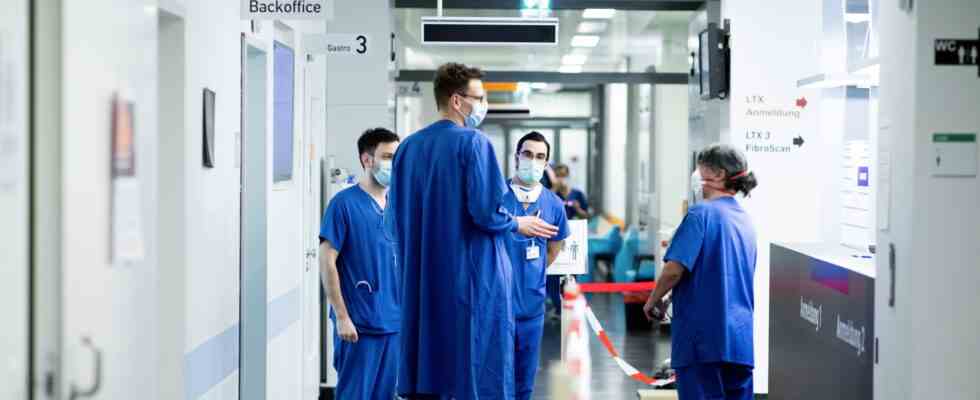Status: 22.04.2022 2:20 p.m
The hospitalization rate is one of the most important corona indicators. But even in the third year of the pandemic, the data from the hospitals is flowing slowly and laboriously to the RKI. Where is the problem?
The process takes ten minutes each time. Ten minutes for every patient who tests positive for Sars-CoV-2 for the first time in the Matthias Hospital in Rheine. The medical staff has to enter data into a form in the hospital software. An encrypted e-mail is then generated, which is then sent to the health department.
“It’s really annoying,” says Jana Schroeder. The chief physician and leading virologist at the Matthias-Spital Foundation can understand the displeasure of her colleagues in the hospital very well.
This is just one example: In other hospitals, faxes are even still being written and sent to the health department. A path that takes time. It can sometimes take weeks for the information to finally reach the Robert Koch Institute.
This highlights problems and delays in digitization in healthcare. Even in the third year of the pandemic, data is flowing slowly and awkwardly. This has consequences – for example for the reliable determination of one of the most important indicators of German corona policy: the so-called hospitalization rate is intended to show how many corona patients per 100,000 inhabitants were admitted to a hospital within a week. This can provide information about how heavily burdened the health system is. Ideally, the fax machines would be sitting around unused for a long time – at least for that.
Without real-time data in the fall?
But what is the reality? How many hospitals use a direct and fully electronic reporting route to the RKI? That’s what Anke Domscheit-Berg, digital policy spokeswoman for the Left Party in the Bundestag, wanted to know from the federal government. The answer dem ARD Capital Studio “If the hospitalization reports continue at this rate and obviously without any liability, we will have to deal with the third autumn wave without real-time data.”
A first step is in progress. According to the federal government, on March 16, the possibility was “released” for hospitals to enter hospitalization for SARS-CoV-2 themselves directly in DEMIS – the German electronic reporting and information system for infection protection. This means that hospitals no longer have to send faxes, but can use an electronic reporting channel offered by the RKI.
From the point of view of the German Hospital Society (DKG), however, this does not change anything significant. At the request of ARD Capital Studios it says: “Even with the new system, the data will initially be recorded and entered manually by the hospital.”
Online form from 2023
But how quickly will this first step be implemented across the board? The federal government writes: The functionality of the corresponding application had been tested “in the last few days as part of pilot tests by initially three hospitals”. “In the following weeks, the other hospitals that are subject to registration should also join.” Mandatory use of the online form is not planned until January 1, 2023. The German Hospital Society wants to promote this approach and assumes that clinics will implement it very quickly.
Left-wing politician Domscheit-Berg is much more skeptical. She describes the government’s response as vague and does not believe that this process will be quick. The politician gained years of practical experience with large IT projects in previous professional activities.
The assessment that the broad connection to DEMIS in terms of the hospitalization rate could continue for many months is also confirmed by experts who are intensively familiar with the matter in practice. Also: The conversion of an IT system and the subsequent training are a complex and expensive process. Therefore, according to another fear, hospitals could not even tackle the implementation because they know that the much bigger step is yet to come.
A complex project
Because the relief of hospitals and health authorities is one thing. But it’s also about speed. In January, the Federal Government’s Corona Expert Council called for the corresponding hospital data to be made available “daily”, in real time. However, the first conversion step initiated is not sufficient for this. The information would have to flow automatically from the hospital information system to the RKI. A complex project, also because there are many different systems.
The federal government writes: With the “provision of an interface planned for the end of May 2022”, the hospitalization reports could be “automated in the future”.
“You can’t express yourself in a more non-binding way,” says Domscheit-Berg. The current answer from the Federal Ministry of Health falls short of previous forecasts. She had hoped that the new government would give the issue a higher priority: “But nothing changes. Again there are announcements and again they are not kept.”

